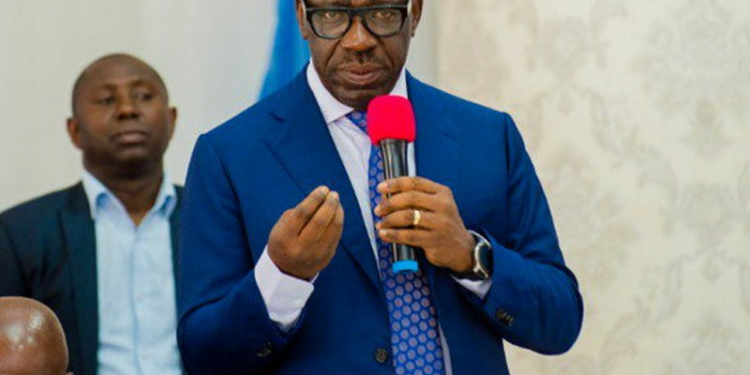- Train health personnel that would be able to respond to emergency situations like the pandemic
- To develop any system, whether it is health or agriculture, required also contributions from middle-level manpower
Governor Godwin Obaseki of Edo State stated on Wednesday that the massive strides his administration made in the health sector were influenced by the COVID-19 outbreak in 2020.
The governor also stated that with the outbreak of the pandemic and the precarious state of the healthcare delivery system not only in Edo State but throughout the Federation, the need to develop a responsive and close healthcare system became critical.
Governor Obaseki, who stated this on Wednesday while commissioning the rebuilt Edo State College of Health Sciences and Technology, Benin City, said that with the COVID-19 experience, he decided to rebuild the college, which was founded 60 years ago, in order to train health personnel that would be able to respond to emergency situations like the pandemic.
Besides, he added that his government then conceived the idea of decentralising healthcare delivery systems in the state by embarking on the massive establishment of primary healthcare centres (PHCs) across the state.
To that end, the governor reiterated that he had no regrets over the demolition of the Benin Central Hospital complex, as 10 solid PHCs had been established in the three Benin metropolitan local government areas to attend to the health issues of the people in those localities.
This was just as his administration upgraded the Stella Obasanjo Hospital, Sapele Road, Benin City, and equipped it with modern facilities to make it competitive with any hospital anywhere in the nation.
Governor Obaseki added that the expectation of the government in the rebuilt College of Health Sciences and Technology was to raise health personnel in all fields such that the state would not be short of health workers at any time and in all segments of the system.
The various PHCs in the state and the modernised Stella Obasanjo Hospital, Obaseki enthused.
“It’s COVID-19 that opened my eyes to the state of healthcare in Edo State and Nigeria, and what made me scared about COVID-19 was not the COVID-19 itself but our ability to respond to the pandemic.
“I was discussing with a friend during COVID-19, and I said if something happened now, we can’t leave Nigeria with all the wealth and the plane that we have for treatment.
“The lesson I learnt from COVID-19 is that we must build our own healthcare system, and healthcare is not only about hospitals and infrastructure you see while sick.
“It is a system that has the most important thing as the people who must be trained to deliver services to the people, and our schools of nurses and colleges of health sciences were closed down and with no accreditation.
“I have to bring down Central Hospital, and I have no regrets about bringing it down. And in place of the central hospital, we have over 10 primary health centres serving the population one hospital used to serve,” Obaseki said.
According to him, “In 2020, I then said if God made me survive COVID-19, I will refurbish all health institutions in the state. Go and see what we have done in Oredo, Amagba, Evhuotubu, and around the state; we are building health centres.
“Nigeria has more than 12,000 political wards, and the policy is that there must be a minimum of one health centre in each ward so that if you are sick, you will not have to travel far or spend more than 15 to 20 minutes before you get to a healthcare centre in your community for treatment.
“That is what we are doing in Edo State. With the almost 200 wards in Edo, if we have to employ an average of 101 health workers in a primary health centre, we need a minimum of 2,000, and where do we have to train them? Nowhere. In Nigeria, we need over 250,000 health workers for our primary healthcare system,” Obaseki reiterated.
The governor added that to develop any system, whether it is health or agriculture, required also contributions from middle-level manpower.
“Yes, we need doctors, but after doctors have attended to you, who do the doctors leave to? It is the nurses and pharmacists, and the doctors will not do the work alone.








Discussion about this post